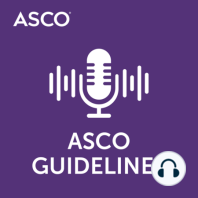11 min listen
Hematologic Toxicities: Management of irAEs Guideline (Part 10)
FromASCO Guidelines
ratings:
Length:
19 minutes
Released:
Nov 11, 2021
Format:
Podcast episode
Description
An interview with Dr. Loretta Nastoupil from MD Anderson Cancer Center, author on “Management of Immune-Related Adverse Events in Patients Treated With Immune Checkpoint Inhibitor Therapy: ASCO Guideline Update.” She discusses the identification, evaluation, and management of hematologic toxicities in patients receiving ICPis, including hemolytic anemia among others in Part 10 of this 13-part series. For more information visit www.asco.org/supportive-care-guidelines TRANSCRIPT [MUSIC PLAYING] SPEAKER: The purpose of this podcast is to educate and to inform. This is not a substitute for professional medical care and is not intended for use in the diagnosis or treatment of individual conditions. Guests on this podcast express their own opinions, experience, and conclusions. The mention of any product, service, organization, activity, or therapy should not be construed as an ASCO endorsement. BRITTANY HARVEY: Hello, and welcome to the ASCO Guidelines podcast series brought to you by the ASCO Podcast Network, a collection of nine programs covering a range of educational and scientific content and offering enriching insight into the world of cancer care. You can find all the shows, including this one, at asco.org/podcasts. My name is Brittany Harvey. And today, we're continuing our series on the management of immune-related adverse events. I am joined by Dr. Loretta Nastoupil from the University of Texas M.D. Anderson Cancer Center in Houston, Texas, author on Management of Immune-Related Adverse Events in Patients Treated with Immune Checkpoint Inhibitor Therapy: ASCO Guideline Update, and Management of Immune-Related Adverse Events in Patients Treated with Chimeric Antigen Receptor T-Cell Therapy: ASCO Guideline. And today, we're focusing on hematologic toxicities in patients treated with immune-checkpoint inhibitor therapy. Thank you for being here, Dr. Nastoupil. LORETTA NASTOUPIL: Thanks, Brittany. I'm happy to be here. BRITTANY HARVEY: Great. Then first I'd like to note that ASCO takes great care in the development of its guidelines and ensuring that the ASCO conflict of interest policy is followed for each guideline. The full conflict of interest information for this guideline panel is available online with the publication of the guidelines in the Journal of Clinical Oncology. Dr. Nastoupil, do you have any relevant disclosures that are related to these guidelines? LORETTA NASTOUPIL: Yes, Brittany. So I have received honorarium for participation in advisory boards from the following companies, including BMS/Celgene, Genentech, Janssen, Novartis, Merck, MorphoSys TG Therapeutics, and Takeda. And I've also received research funding support from BMS/Celgene, Gilead Kite, Genentech, Janssen, Novartis and Takeda. BRITTANY HARVEY: Thank you for those disclosures. Then let's get into what we're here today to talk about. So what are the immune-related hematologic toxicities addressed in this guideline? LORETTA NASTOUPIL: So it's important to recognize that hematologic toxicities that are immune-related as a result of immune therapy are infrequent occurrences. So it's important to recognize when they do occur and some of the unique workups given that they are so infrequent. So probably one of the most common is hemolytic anemia. It's important to recognize that these are cancer patients. And they may have multiple reasons for the development of acute or new onset anemia, but recognizing if they're on either checkpoint inhibitors or immune therapies, it's important to recognize that it might be spurred on as a result of immune-mediated anemia. We advise in terms of history and workup to consider whether or not they've been exposed to new drugs, whether or not they've had a recent insect or snakebite exposure. The recommended workup includes a CBC with also a peripheral blood smear to look for evidence of hemolysis or macrocytosis. In addition, other hemolytic anemia workup includes evaluation for LDH, haptoglobin, reticulocyte count
Released:
Nov 11, 2021
Format:
Podcast episode
Titles in the series (100)
Early Detection for Colorectal Cancer Resource-Stratified Guideline: An interview with Dr. Marcia Cruz-Correa from the University of Puerto Rico and MD Anderson Cancer Center on the ASCO Resource Stratified Guideline on early detection for colorectal cancer. The purpose of this podcast is to educate and to inform. This... by ASCO Guidelines
